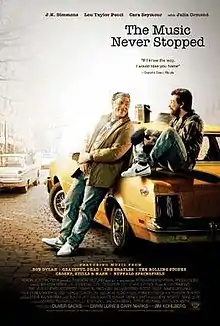The Music Never Stopped
The Music Never Stopped is a 2011 American drama film directed by Jim Kohlberg, who makes his directorial debut from a script by Gwyn Lurie and Gary Marks.
| The Music Never Stopped | |
|---|---|
 | |
| Directed by | Jim Kohlberg |
| Produced by | Neal Moritz |
| Written by | Gwyn Lurie Gary Marks |
| Based on | The Last Hippie by Oliver Sacks |
| Starring | J.K. Simmons Julia Ormond Mía Maestro Lou Taylor Pucci |
| Music by | Paul Cantelon |
| Cinematography | Stephen Kazmierski |
| Edited by | Keith Reamer |
Production company | Essential Pictures Mr. Tamborine Man |
| Distributed by | Roadside Attractions |
Release date |
|
Running time | 105 minutes |
| Country | United States |
| Language | English |
| Box office | $150,515[1] |
It premiered at the 2011 Sundance Film Festival, and was given a limited release in the US on March 18, 2011.
Plot
Based on Oliver Sacks' essay The Last Hippie, the film tells the father-son relationship between Henry Sawyer (J.K. Simmons) and his son, Gabriel (Lou Taylor Pucci), who suffers from anterograde amnesia as the result of a brain tumor. Henry, with his son unable to shed light on their strained relationship, must connect with him through music.
Cast
- J.K. Simmons as Henry Sawyer
- Julia Ormond as Dianne Daley
- Mía Maestro as Celia
- Lou Taylor Pucci as Gabriel Sawyer
- Tammy Blanchard as Tamara
- Cara Seymour as Helen Sawyer
- Scott Adsit as Doctor Biscow
- Max Antisell as Young Gabriel Sawyer
Release
Critical response
The film currently holds a 67% "fresh" rating on Rotten Tomatoes, based on 49 reviews.[2] Ty Burr of The Boston Globe remarked the film was "one to remember", also calling it "sentimental, yet so honest and eccentric that it rises above schmaltz".[3] Nathan Rabin of The A.V. Club compared the film's story to The King's Speech, giving praise to J.K. Simmons and Lou Taylor Pucci and calling the film a "powerful, even shattering look at music's power to unite where it once divided".[4]
References
- "The Music Never Stopped". Box Office Mojo. Retrieved April 1, 2011.
- "The Music Never Stopped (2011)". Rotten Tomatoes. Retrieved June 7, 2015.
- "The Music Never Stopped". Boston Globe. Retrieved April 4, 2011.
- "The Music Never Stopped". The A.V. Club. Retrieved April 4, 2011.